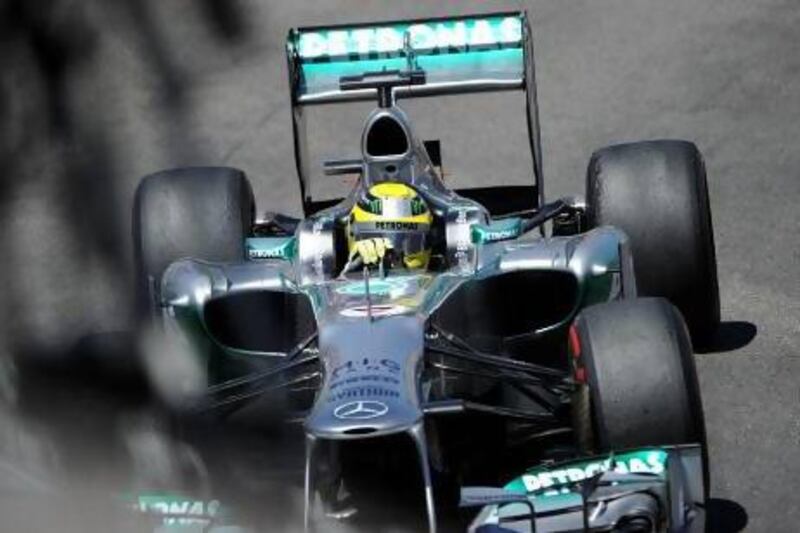Lift gun, aim at foot, fire.
At times it seems these are the instructions Formula One lives by.
Sunday's Monaco Grand Prix was supposed to be the sport's piece de resistance and yet, as the sun slipped down and drowned in the Mediterranean, the final taste left in the mouth of the sport's supporters was not foie gras or escargot, but rather a bitter sense of ridiculousness.
F1's latest cause celebre overshadowed what should have been a day of monumental magnitude for race winner Nico Rosberg, the 27-year-old Mercedes-GP driver who has lived in Monte Carlo for almost as long as he has in his father Keke's shadow.
Instead, while the German embraced his family and friends, his team principal, Ross Brawn, was being summoned by race stewards to explain a seemingly secret tyre test held earlier this month in Spain.
In-season testing for teams is illegal with only a few exceptions, such as straight-line aerodynamic tests and Young Driver Tests.
Why Mercedes thought they could rack up 1,000 kilometres in their 2013 car around the Circuit de Catalunya in Spain is an issue Brawn surely had to explain to race stewards.
Likewise, Pirelli, the sport's sole tyre supplier, are allowed to ask for a team to provide them with a car so they can trial their compounds, but they must make the same offer to all 11 racing marques.
Whether Paul Hembery and his team complied will be the crux of their involvement in the ongoing investigation.
On Sunday evening, the Italian company were adamant they had done everything above board.
In the travelling circus that is F1, such is the sense of Schadenfreude and Machiavellian tendencies that it is easier to calculate times when there has not been a drama hanging over the paddock.
It is for this reason the sport's authoritative figureheads must exert clarity and control, and yet, too often it has not been forthcoming.
This particular controversy appears to have been created through a lack of lucidity in the rulebook of the Federation Internationale de l'Automobile, the sport's governing body.
There is no reason to suggest Mercedes would deliberately risk their reputation unnecessarily.
They are behemoths of the automotive world and have spent millions recruiting some of the sport's most prominent technical talent, as well as the 2008 world champion Lewis Hamilton.
By not packing up their lorries and motorhome after the Spanish Grand Prix, it would seem they thought they were working within the rules, and yet if found guilty of breaking them, they could face a massive financial penalty.
Some commentators have even suggested the marque could be thrown out of this year's world championship.
Were that to happen, the future involvement of Mercedes, whose relationship with Formula One is by no means indestructible, would surely be questioned.
Likewise, Pirelli have yet to extend their contract with F1 and if they walked away now, it could hardly be held against them, such has been the criticism and negative publicity they have faced.
Aside from the obvious irony of trying to strengthen their road-car customer base by designing racing tyres that degrade quickly, Pirelli must also wonder whether being made scapegoats as Formula One bosses struggle to discover the equation to entertaining racing is genuinely worth their while.
With one of the most influential teams in the paddock under investigation and the sole tyre supplier threatening to walk away, only somebody wearing the kind of tinted glasses favoured by Flavio Briatore would argue the sport has a stable footing.
Something needs to change and yet a lack of economic equality sees Red Bull Racing and Ferrari reap far more revenue from the sport than any of the other nine teams.
The introduction of cost-cutting measures were due to improve the unbalanced situation, yet the new lesser-powered engines for next year are so extortionately priced, teams are struggling to afford them.
So while the Formula One fraternity might have enjoyed a weekend of lavish parties aboard super-yachts in Monaco Harbour, the sport is in rough seas.
The majority of marques are simply keeping their heads above water; bobbing along from race to race, hoping not to be sucked down into the depths of a sea of debt.
The last thing it needed was an unclear rule causing a tete-a-tete between some of its most powerful teams.
The last thing it needed was to shoot itself in the foot once again.
Follow us
[ @SprtNationalUAE ]





